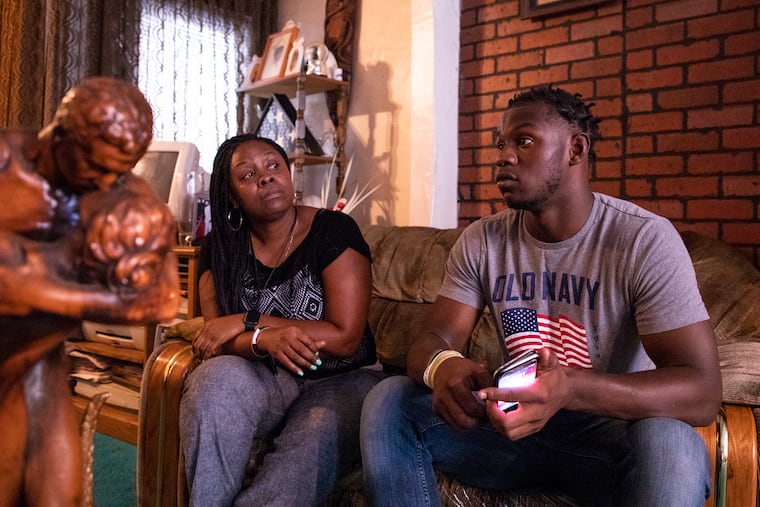A Philly rugby star overcame a stray bullet. Now the Army won’t have him. | Mike Newall
“I don’t want to close my eyes without seeing what the world is like.”

In February 2018, Quiana Boston stood in the ICU at Hahnemann Hospital, staring at her son and the tubes poking in and out of his 17-year-old body. The ones feeding him, draining fluids, helping him breathe.
Nasair Boston-Epps, then a Philadelphia Military Academy junior, had been hit by a stray bullet while waiting for a bus to his after-school job at McDonald’s. Earbuds in, he never heard the shot. But he felt the burn of the slug, and the blood soaking his McGriddle T-shirt.
Quiana had missed the call from Nasair while she was working in Amtrak’s customer service. Then came one from Hahnemann. The hospital was asking if they could perform emergency surgery. On Roosevelt Boulevard she ran every red light. The .22-caliber bullet had ricocheted around Nasair’s insides and lodged against his skin. Doctors removed parts of his colon and intestines. In the days after the shooting, it became clear he would survive.
But now, Quiana is worried his dream won’t.
‘I don’t want to close my eyes without seeing what the world is like’
Nasair’s singular goal is to become a physical therapist in the U.S. Army. He’d decided to join as a freshman, hoping to follow his grandfather and great-great-grandfather, who’d served during Vietnam and World War II — and his father who is a Navy Gulf War veteran. Coming so close to death only crystallized his determination.
“I don’t want to close my eyes without seeing what the world is like,” he told me.
Quiana instilled in Nasair the principles of respect and hard work. “If he wanted something, he always had to sell me on it,” she said. And at first, the Army was a tough sell.
Then came the bullet, and with it, a terrifying realization: Quiana would rather her only child be overseas than here.
“With all this killing in Philadelphia, it’s safer there, honestly,” she said.
Nasair, solidly built and always fit, recovered — and then some. Four months after surgery, the tubes and the bullet were removed. Soon, the teen was back to his six-mile runs from his North Philadelphia home to City Hall. With his doctors’ clearance, he was back captaining the elite rugby team of Philadelphia public high school students, the Nomads, even playing in national tournaments.
And his Army dreams seemed intact.
‘You will get the best soldier out of him’
As graduation neared, Nasair took his military vocational exams, scoring better his second time. He passed a drug test. His medical records were shipped to Fort Dix, along with a letter of recommendation from his family doctor at Jefferson University, who deemed Nasair an “outstanding candidate for our military.”
“He made an extraordinary recovery,” the physician, Christopher Chambers, wrote. “He is the epitome of physical fitness.”
Weeks passed. Recruiters assured Nasair everything was fine, that the doctors were likely just reviewing his medical history.
Quiana had T-shirts made up: “Proud Army Mom: Most People Never Meet Their Hero. I Raised Mine!”
The news came in July that everything wasn’t OK. That even when a bullet doesn’t take a life, it can take so many other things.
Army higher-ups rejected his medical waiver, noting his resectioned bowel. The surgery that saved his life is keeping him from service.
Even his recruiter was surprised.
“He’s fit. He’s qualified. Something that happened to him that wasn’t his fault, shouldn’t stop him,” said Staff Sgt. Quoya Debose, who met Nasair his junior year.
And Lt. Russell Gallagher, commandant at the Philadelphia Military Academy, pointed out that Nasair led his school’s elite athletic competition squad, with more push-ups, sit-ups, and pull-ups than most other members. “He sets the standard for the one-mile run,” he wrote in a recommendation. “I am confident that he will be able to meet or exceed all physical challenges placed before him in Basic Training and beyond.”
Army representatives at Fort Dix said they couldn’t comment when I called this week. Nasair and Quiana have filed an appeal with their congressman.
“He wanted this so bad,” his mother said. “You will get the best soldier out of him — because he wants it.”
Nasair is set to start community college courses in the meantime — classes on physical therapy, to give him a head start for what he hopes will still be a career in the Army.
“My mom says if one door closes, another one will open,” he said. “I feel like this one is closing on me and I’m trying my best to keep it open.”
If the Army doesn’t change its decision, Quiana is thinking of moving her family somewhere else. Somewhere safer. Somewhere where bullets don’t stop so many dreams.